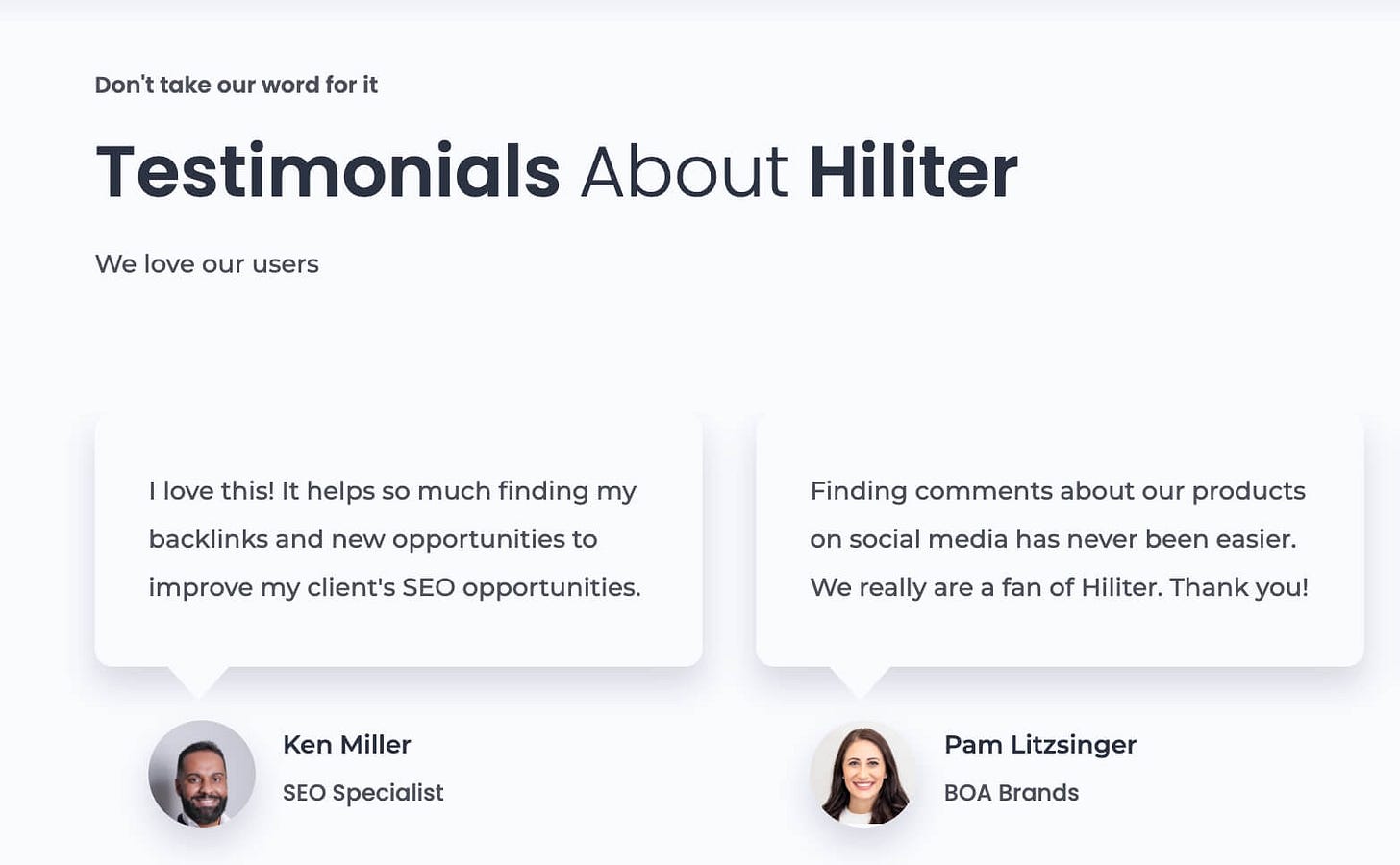I didn't want to have to talk about Bud Light, but here we are
Also, Hiliter is a little too close to someone's name...
Hello Gobbledeers,
How’s it going? Any of you get fired from your cable talk show hosting duties? No? Good for you.
I’m a rare marketer who doesn’t really think the name of your company matters that much. Please don’t try to convince me otherwise. I know that changing your company name is super fun and everything. Good for you.
Except sometimes I’m wrong about this:
Hm. Like, nobody skimmed that and thought:
Somebody: “Hey boss, y’know, there’s something about the name of our company.”
Boss: “What? That it shows exactly what we do? Since we hilite, it shows that we’re a hiliter of things?”
Somebody: “Well certainly that’s true. But also, when you read it quickly, it just looks like, I dunno, like maybe it has some bad associations?”
Boss: “What’s bad about it? That you can quickly see keywords and links on every page?”
Somebody: “No, boss, that’s great. Just great. But, maybe it’s just me - I don’t want to project here. But…can I show you the Testimonials section?”
Boss: “Sure!”
Somebody: “When you skim that headline…it doesn’t bring to mind anyone? Maybe someone terrible?”
Boss: “Nobody’s terrible here. One of our values is ‘Don’t be terrible.’ Don’t you remember the 9-day offsite where we worked on that? Do I need to ask you to recite our 4 key values?”
Somebody: “Please don’t ask me to do that. But something about the name…”
I guess if you’re thinking about a name for your company, make sure nobody glances at it and thinks, “I guess Osamabnladn.io wasn’t available?”
(Credit where it’s due - thanks @levelsio on Twitter)
At Least Everyone Can Agree on Dogs
One of the things about Internet discourse is that nobody is ever allowed to say, “Gee, this is a really difficult situation, and I can understand there are valid arguments on both sides.” (Where’s the fun in that????)
But that’s pretty much where I’ve landed on the Bud Light marketing situation.
(For the sake of this discussion, the both sides are Anheuser-Busch (AB) management on one side and the VP of Marketing for Bud Light on the other. Kid Rock shooting a machine gun at cases of Bud Light is on neither side.)
If you’ve missed this story - the very short version is that the VP of Marketing for Bud Light approved a campaign where the company sent a personalized can of their beer to an influencer who is transgender, and that influencer made a TikTok about it and then exactly what you might think would happen happened, and here’s a few of those things:
Conservative backlash online explodes, fueled by Kid Rock’s video of himself with the gun and the shooting and the cursing at the company (see above). I give him credit for his passion. I’m trying to imagine what the fine, cinnamon-flavored folks at Cinnamon Toast Crunch would have to do where it would anger me to the point where I would film myself taking a baseball bat to a case of it to protest. Like if Cinnamon Toast Crunch said, “We support banning drilling in the Arctic National Wildlife Refuge” and I would completely lose my shit and buy a bunch of Cinnamon Toast Crunch and bash it into a million delicious pieces because they believe that there’s reasons to protect the Arctic. Anyway, 10 points for your passion, Mr. Rock. Maybe negative 20 points for caring who drinks the same beer as you.
The CEO of AB releases a statement that’s actually quite good in terms of all the stuff we talk about here - it actually spells out their values clearly and reflects what the company stands for, including “a proud history supporting our communities, military, first responders, sports fans and hard-working Americans everywhere…” and that they will continue to focus on “the values upon which America was founded: freedom, hard work and respect for one another.” It says that, but it definitely means, “I can’t believe I’m being dragged into this.”
Backlash continues as Internet people share images from a Canadian Bud Light promotion a while ago where they - wait for it - had rainbows on their Bud Light cans and then get increasingly angry that they thought Bud Light stood for military, first responders, sports fans and hard-working Americans, and not for people who are just minding their own business living their lives with whoever they choose to live their lives with. This is a good reminder that for global companies, you can safely assume that any promotion you do in one country can/will be dragged into a controversy in another country if it will benefit someone (see also, Ben & Jerry’s and Israel.)
If you think that activism (even activism you don’t necessarily agree with) doesn’t matter, Beer Business Daily reports that Bud Light sales are down 21% since all of this started.
Bud Light’s VP of Marketing and her boss both either take a leave of absence or are placed on a leave of absence following all this. The company releases (yet another) statement that includes this: “We have made some adjustments to streamline the structure of our marketing function to reduce layers so that our most senior marketers are more closely connected to every aspect of our brands’ activities…” Which means the senior team is going to approve everything from now on.
Now you’re caught up.
So let’s imagine you’re the CEO of Anheuser-Busch. You are definitely not involved in approving every influencer campaign, because you have other things to worry about. You’ve hired layers of marketing execs to worry about influencer campaigns.
Specifically, you’re worried about not pissing off your core customers. And even more specifically, you’re worried about not pissing off your core customers to the point where they buy from your competitors and 21% less from you.
And - whatever you think about Bud Light - it’s a mass brand, with mass appeal. And you hired your marketing people to come up with campaigns that reflect your positioning - an everyday beer for hard-working freedom-loving Americans.
And you know that that positioning, while having mass appeal, also is walking a bit of a fine line, in that you can understand how it can be appropriated by one side of the political spectrum or the other…
…But that’s why you hired your marketing team. To build campaigns that have mass appeal while walking that line.
So here’s where I’m torn:
On the one hand, shouldn’t mass brands stand up for human rights? Why wouldn’t they say, “Kid Rock, we believe in freedom just like you and part of freedom is the right to be who you are?” Why did AB back down and then (apparently) fire the people responsible for the campaign, which had the effect of pissing off the left while not making the right change their feelings about Bud Light?
On the other hand, maybe we accept that even if we believe this is a human rights issue, we can understand that it’s still an issue that’s clearly very touchy for a bunch of people, even if we disagree with them vehemently. And that if you’re a mass brand that appeals to people who are not necessarily always progressive in their social views (???), that you would be expected to stay away from any of the issues that divide people (even if you believe one side is right) and focus instead on, for example, having a fun spokesdog like Spuds Mackenzie (and maybe now it’s becoming clearer why using dogs in your marketing is always a winner.)
So I don’t know. Should the CEO of AB have used this opportunity to put a stake in the ground on this issue, which frankly would’ve been pretty off-brand for them? Or should the CEO fire the marketing people because they ran a campaign that didn’t align with the values of the brand? I’m curious what everyone here thinks…
(I mean I’m actually curious - I’m really torn about this. And it would be easy for me to say, “That CEO is wrong!” But I’m honestly, truly not sure.)
As always, thank you for reading and sharing Gobbledy.
And I love chatting with all of you - If you want to talk about your website or positioning or how to make sure the name of your company isn’t dangerously close to that of a mass murderer, here’s my Calendly link.






Like our Gobbledy Guide, I’m conflicted on this topic, although for different reasons.
Corporations may have a moral responsibility not to cause overt harm to their customers or to the broader planet, but the definition of what constitutes harm is so malleable that it can be difficult to arrive at a consensus, let alone to hold decisions to a moral standard.
We could agree it’s probably a bad idea to replace all of the rainforests in Brazil with hop fields. But is it harmful to promote alcohol as a social lubricant when it’s known that doing so may result in binge drinking?
On the other end, it seems equally difficult for corporations to promote genuine social good. They’re imperfect vessels of morality because they are ultimately beholden to their shareholders. Sure, there may be benevolent companies like Patagonia, which seems to strike a balance between selling good stuff and doing good stuff, and ties its charity convincingly with its brand story. But most companies aren’t innately built on a foundation of charity. Which means that, although they may embark upon genuinely beneficial social-good campaigns, they have a difficult time coherently connecting their causes to their brand, and they’re willing to support them only to a point. And that point is when their shareholders get mad.
As a result, corporations tend to glom on to well-trodden social issues, and in such hackneyed ways that their efforts ring hollow. Mars introduces a purple M&M for International Women’s Day. Will it make a difference to the plight of disadvantaged women? No, but it’s not going to ruffle any feathers.
Despite the weird association of light beer with trans rights (huh?), I wish A.B. hadn’t buckled. But they did, and in the process showed the weakness of their initial support and the suckiness of their marketing (messaging gobbledy?). And that’s a tragedy, because it’s a cause that could truly benefit from broad backing and social normalization. Oh, well.
In the end, A.B.’s mission is to improve people’s tipsiness, not their lives. And when your mission is that deeply ingrained, a halfhearted marketing campaign isn’t going to change it.
I look at this far more simply, which is not surprising because, as our host knows, I'm quite simple. The progressive left isn't pounding Bud Light at a tailgate or Falls Sports Lounge. By engaging in whatever they did, they violated a basic tenet of business: don't piss off your customer. That customer has dozens of other equally mediocre options at the same price point. Very few people (read, no one) are thinking, "Bud Light tastes way too good, I can't possibly switch brands, despite the fact that they kick puppies."
AB's job is to do what it's put here to do: get people hammered at house parties. Sorry, I meant to say, to put out a consistent product and provide returns for its shareholders. That's their legal obligation. Yes, they can and should be good corporate citizens while doing that, but if they decide to wade into the shallow waters of the culture wars, they've strayed from that core function, obviously at great risk to their bottom line. And because a few people at AB thought they were smarter than the average bear, they got what they got cause they pissed off their customer. Now, who needs a cocktail?